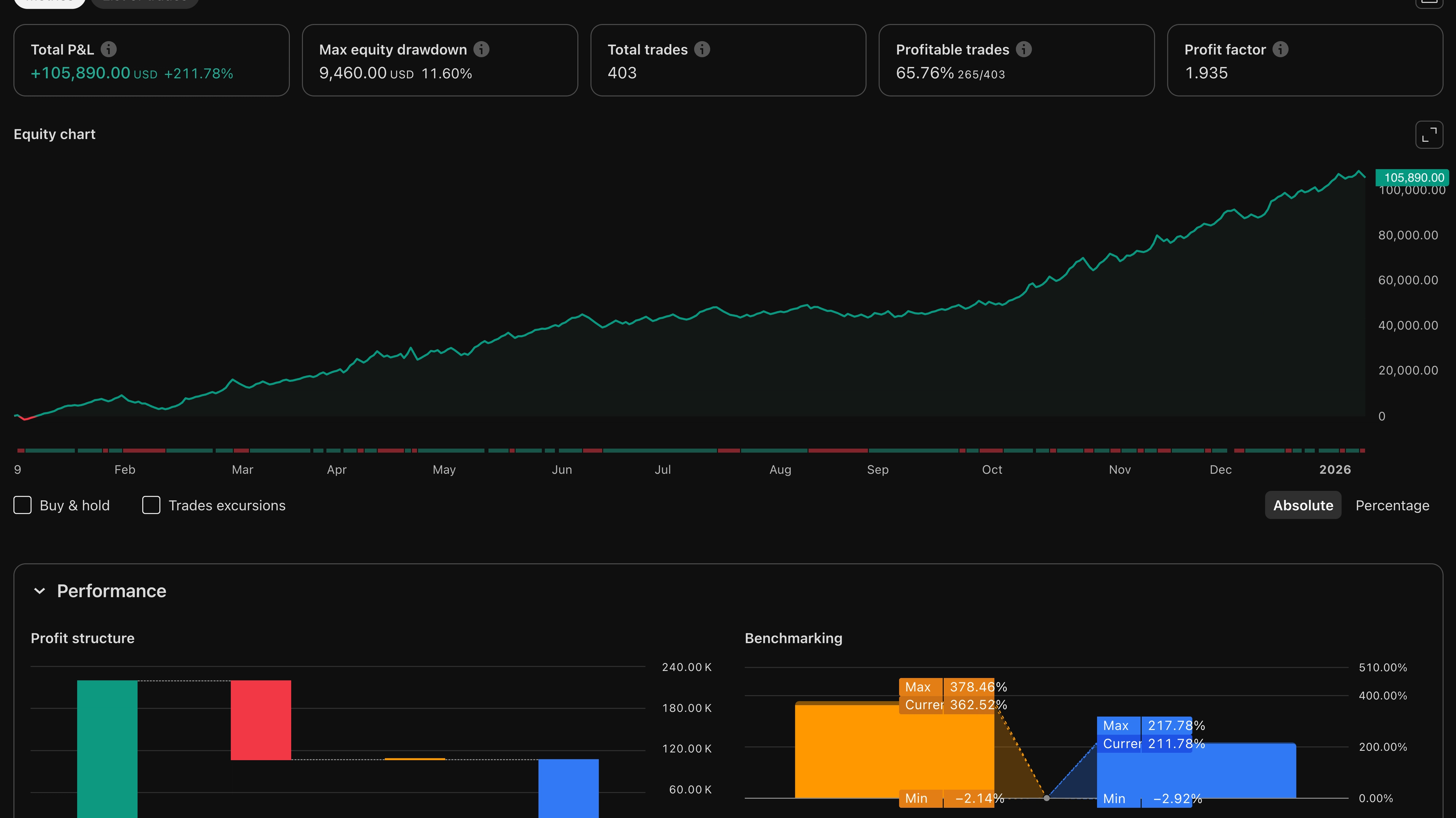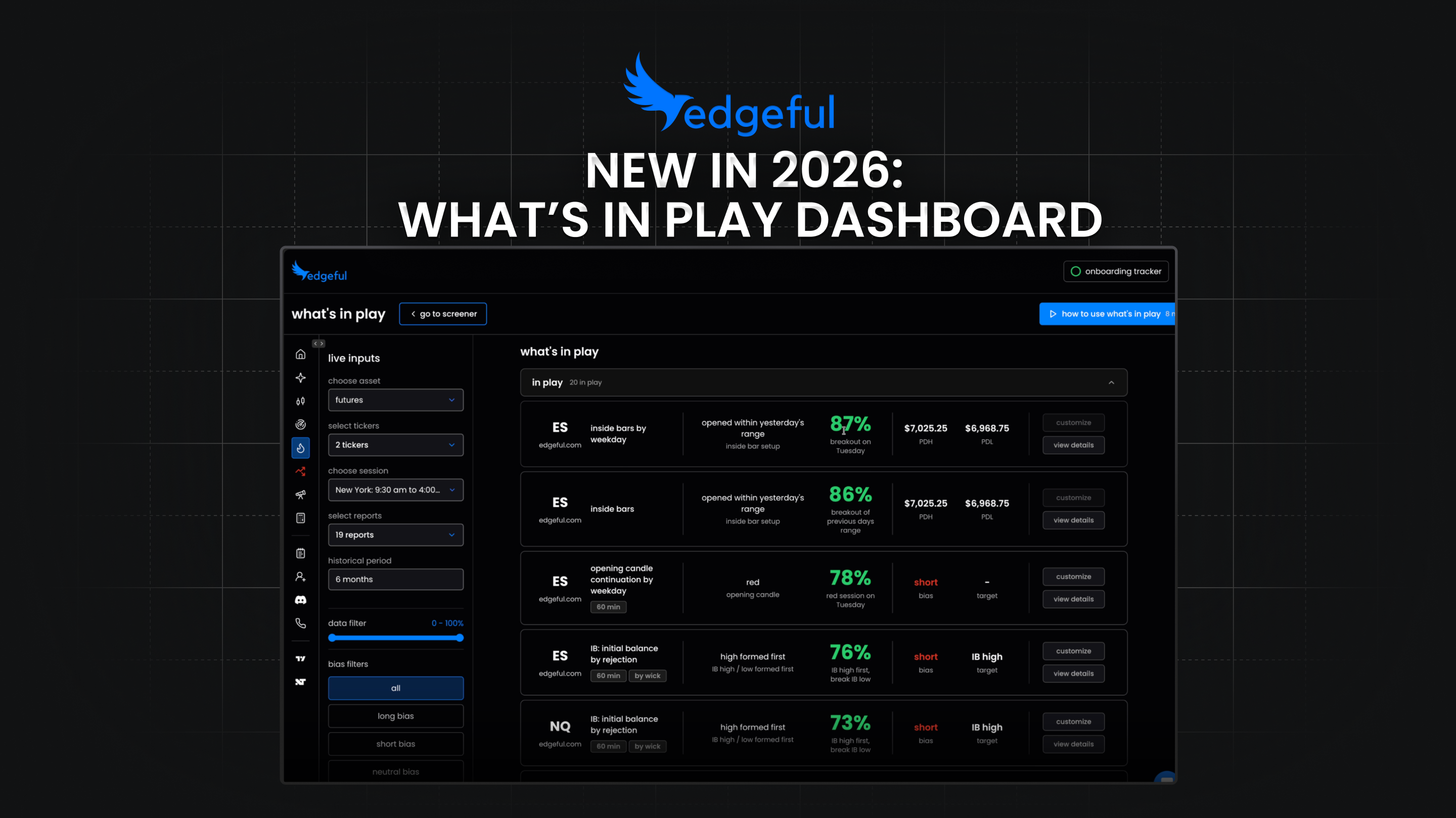trading psychology: how a base hit approach builds consistent profitability

the psychology behind choosing base hits over home runs
the way we think about trading has a profound impact on our results. one of the most powerful psychological shifts you can make is moving from an outcome-focused mindset ("how much can I make on this trade?") to a process-focused approach centered on small, consistent wins.
picture this: instead of swinging for the fences on every trade, you focus on capturing consistent, small profits. $100 here, $200 there, and stacked over a day of trading, you might be up $400 by the time it's all said and done.
it might not seem like much at first, but the psychological benefits—combined with the power of compounding—create something remarkable.
if you could make just $400 a day trading, that's $100,000 per year. and the best part? you could potentially achieve this in under an hour of actual trading during the session.
in this post, we'll explore the psychological framework of focusing on small, consistent wins – the "base hits" of trading – and how this mindset can transform both your trading results and your emotional relationship with the market.
the psychological principles behind base hit trading
at its core, the base hit approach addresses several fundamental psychological challenges that traders face:
1. delayed gratification vs. immediate rewards
research in psychology consistently shows that humans struggle with delayed gratification. we're wired to prefer immediate rewards over larger future payoffs. this explains why many traders exit profitable positions too early or chase large gains instead of accepting smaller wins.
the base hit approach works with our psychology rather than against it by providing regular, attainable rewards that satisfy our need for immediate gratification while still building toward larger goals.
2. loss aversion and risk perception
studies show that the pain of losing is psychologically about twice as powerful as the pleasure of gaining. this "loss aversion" explains why many traders hold losing positions too long while cutting winners short.
by focusing on smaller targets with higher probability, the base hit approach reduces the impact of loss aversion, as each individual trade carries less emotional weight.
3. cognitive load and decision fatigue
every trading decision depletes your mental energy. swing-for-the-fences trading requires constant evaluation of whether to hold or exit as positions move, creating significant cognitive load and decision fatigue.
the base hit approach reduces this burden through predefined, achievable targets, freeing up mental resources for better decision-making throughout the trading day.
three key psychological benefits of base hit trading
by building your account with base hits, you're cultivating specific psychological advantages:
- reduced emotional volatility - smaller, more consistent wins create less emotional turbulence than the rollercoaster of swinging for home runs
- increased psychological resilience - regular positive reinforcement builds confidence that helps you weather inevitable drawdowns
- improved decision-making capacity - clear rules and defined targets reduce the cognitive burden of trading decisions
focusing on base hits isn't just about the money—it's about developing a winning mindset. every time you actually take profit at a preplanned point, you're reinforcing positive trading habits and building confidence in your abilities as a trader.
confidence is crucial because it allows you to stay disciplined and stick to your plan, even during challenging market conditions. when you trust in your process and know that consistent small wins add up, you're less likely to make impulsive decisions or deviate from your strategy.
applying trading psychology to high-probability setups
the psychological benefits of the base hit approach become even more powerful when applied to high-probability trading setups. here are three data-backed strategies that work perfectly with this psychological framework:
1. inside days & previous day's range
in this example, you can see SPY opens within the prior day's range, triggering a potential inside day setup. after letting the first 30 minutes trade and develop a range, we can look to:
- short a break of the lows (knowing on SPY that price has an 88% chance to exceed yesterday's range)
- with targets at the previous day's low
- stops would be at the previous day's high or at the high of the opening range
this resulted in a 1.88R trade – a perfect base hit.
psychological advantage: the high probability nature of this setup (88%) creates confidence in the trade, reducing anxiety and allowing for clearer thinking during execution.
2. power hour breakout
in this TSLA example, we've got a simple bear flag breakdown that occurs right at the start of "power hour" (the final trading hour from 3:00-4:00 PM ET).
if you're short the breakdown, you have to assume price is not going to make new lows on the day (86% chance price does not make a new LOD). this means you're taking profits along the way, and further weakness right near the close is a great opportunity to do so.
psychological advantage: having clear, data-backed expectations about price behavior during specific time periods removes uncertainty and the emotional turmoil that comes with it.
3. gap fill strategy
this classic setup offers excellent base hit opportunities:
- potential short entry area: gap consolidation low (green line)
- potential stop loss area: above current day's high (red line)
- potential target area: prior session's close (PSC)
psychological advantage: gap fills provide clear visual targets that are easy to identify and track, reducing the tendency to move targets based on emotions as the trade develops.
the psychological pitfalls of home run trading
understanding why the home run approach typically fails psychologically helps reinforce the value of the base hit mindset:
- anxiety and stress - larger targets mean more time in trades and greater price fluctuations, increasing cortisol levels and stress
- cognitive distortions - longer trade duration allows more time for psychological biases like confirmation bias and selective perception to influence decisions
- identity attachment - traders often tie their self-worth to the size of their winners, creating unhealthy psychological dependencies
- all-or-nothing thinking - the home run mindset fosters black-and-white thinking patterns that can lead to destructive trading behaviors
by understanding these pitfalls, you can better appreciate how the base hit approach creates a healthier psychological environment for your trading.
developing your trading psychology through the base hit framework
here's how you can implement this psychological approach:
- start with identity shift - begin seeing yourself as a "process trader" rather than an "outcome trader"
- establish clear psychological metrics - track not just your P&L but your adherence to process and emotional state during trading
- create environmental cues - set up your trading station with reminders of your base hit approach
- utilize psychological circuit breakers - implement rules that take you out of the market when your psychology becomes compromised
- celebrate process victories - acknowledge when you follow your plan perfectly, regardless of the outcome
remember, the goal is psychological consistency, not perfection. by focusing on base hits and leveraging data-driven insights, you'll be developing both a trading strategy and a psychological framework for long-term success.
the psychology of process over outcome
making the shift from swinging for the fences to focusing on base hits requires a fundamental change in how you think about trading success. instead of defining success by the size of individual winners, you begin to measure it by your consistency in executing your process.
this psychological shift from outcome to process thinking is perhaps the single most important change you can make as a trader.
when you trade with a process orientation:
- losses become learning opportunities rather than failures
- consistency becomes more important than occasional big wins
- emotional stability improves as you detach from individual trade outcomes
- long-term growth becomes sustainable rather than erratic
so start small, trust the process, and let focusing on the process overpower focusing on the outcome. good things will happen—both financially and psychologically.
the most successful traders aren't those who make the most on a single trade - they're the ones with the healthiest relationship with the market, who consistently stack small wins day after day, week after week, until those base hits add up to substantial returns.
want to discover more about trading psychology and high-probability setups perfect for the base hit approach? explore our data-driven platform to start building your psychological edge in the markets.


